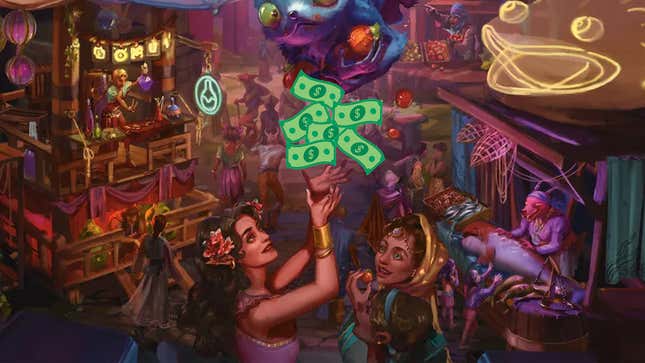
Dungeons & Dragons is so synonymous with its hobby that I, like many people who play TTRPGs other than D&D, often just refer to such games as “D&D” for short. But apparently that kind of name recognition and dominance in the field isn’t enough for publisher Wizards of the Coast. Based on comments made during an investor call with the CEOs of Wizards of the Coast and its owner, Hasbro, the companies are interested in finding ways to increase monetization strategies linked to “the world’s greatest roleplaying game,” similar to the kind we all know and love in video games: microtransactions and subscriptions.
As reported by Dicebreaker, Hasbro CEO Chris Cocks and Wizards of the Coast CEO Cynthia Williams are looking to grow the future of Dungeons & Dragons through “the type of recurrent spending you see in digital games.” Highlighting the fact that Dungeon Masters (or “game masters,” players who “run” the game and control all non-player characters and monsters) spend the most on the hobby through rulebooks and digital services, Williams bemoaned the fact that players (those who only play individual characters) just aren’t spending enough to play in the company’s fantasy world. She described D&D’s current state as “under monetized.”
Many who are familiar with the hobby might find these comments somewhat odd. As the world’s most popular tabletop roleplaying game, Dungeons & Dragons has a variety of ways players and game masters can purchase official materials and spend money on the game, which has, by Williams’ own admission, “never been more popular.”
It’s true that purchasing the core rulebooks costs around $100ish and can provide you with a lifetime of material to play with, if you wanted to save money and use your imagination like some kind of monster. A hundred bucks isn’t nothing, but it’s hardly the amount that, say, a lifelong gamer is likely to spend on new video games in a year, and many players of video games do spend much more than that just on microtransactions within their favorite titles. However, some might say this ability to spend around 60 to a hundred bucks and then let your imagination guide you the rest of the way is the appeal of the hobby. It’s approachable, affordable, and has a personal, “unplugged” feel to it. But then again, that doesn’t match up with the kinds of spending models we see in “digital games.”
So from a certain angle, perhaps it’s easy to understand why executives at WOTC and Hasbro may lament that someone can just buy a few books, get some dice, and spend the rest of their lives happily playing the game without spending another cent. There are plenty of great supplemental sourcebooks available too, though, which, for $30 to $60, offer new options for character creation, new magic items and abilities, and the like. There’s also a digital service known as D&D Beyond, which offers online access to various rules tools and reference materials, all available at various tiers of free and paid options, including microtransactions for individual classes, magic items, monsters, spells and more.
In that sense, the “digital games”-style spending models are already there, and Dungeons & Dragons has hit a new level of pop culture awareness in recent years through television shows like Stranger Things and the streaming phenomenon that is Critical Role Folks want to get into D&D like never before, and there’s no shortage of DMs happy to set up a game for new players who aren’t sure of the time or financial commitment. The magic of D&D sometimes is realizing how much fun you can have just sitting around the table with friends, or on a Zoom call, telling a story and throwing some dice. Sometimes it’s not even about the game as much as it is just hanging with fun, entertaining people. Wizards, it seems, wants people to pay more for this experience, and more often, too.
These comments come as D&D is currently undergoing a transition from its wildly popular fifth edition ruleset published eight years ago to its next revised set of rules with the so-called One D&D. This new frontier promises a brand new digital playspace and tighter integration with D&D Beyond’s suite of online tools. What we’ve seen of the new digital tools sure looks like a video game, and it’s depressing to think that, central to the development of the next generation of the hobby, are c-suite dreams of a pay-to-play extravaganza. And when you look at D&D Beyond, it feels like the financial infrastructure is already in place to make this happen, even if some of WOTC’s plans to capitalize on that infrastructure may have yet to be revealed.
The next time you start working on some homebrew rules and stories, won’t you please think of the poor CEOs who lose sleep over the fact that you’re not paying enough to do so? And don’t you dare consider playing another game like Pathfinder or 13th Age.